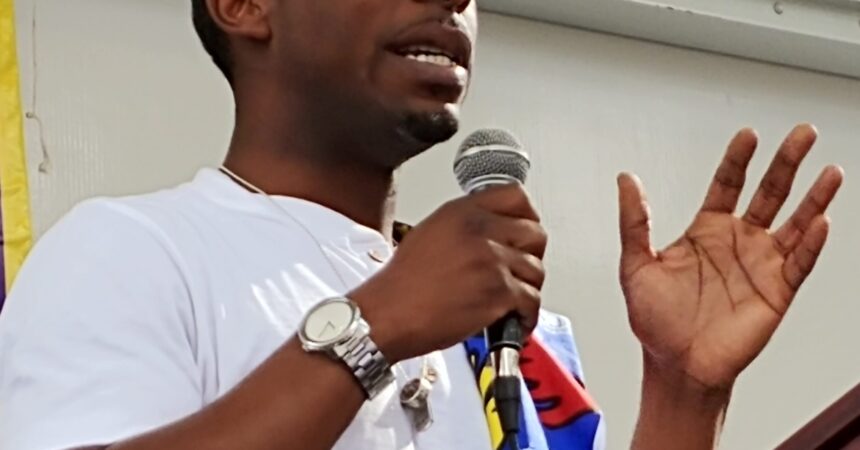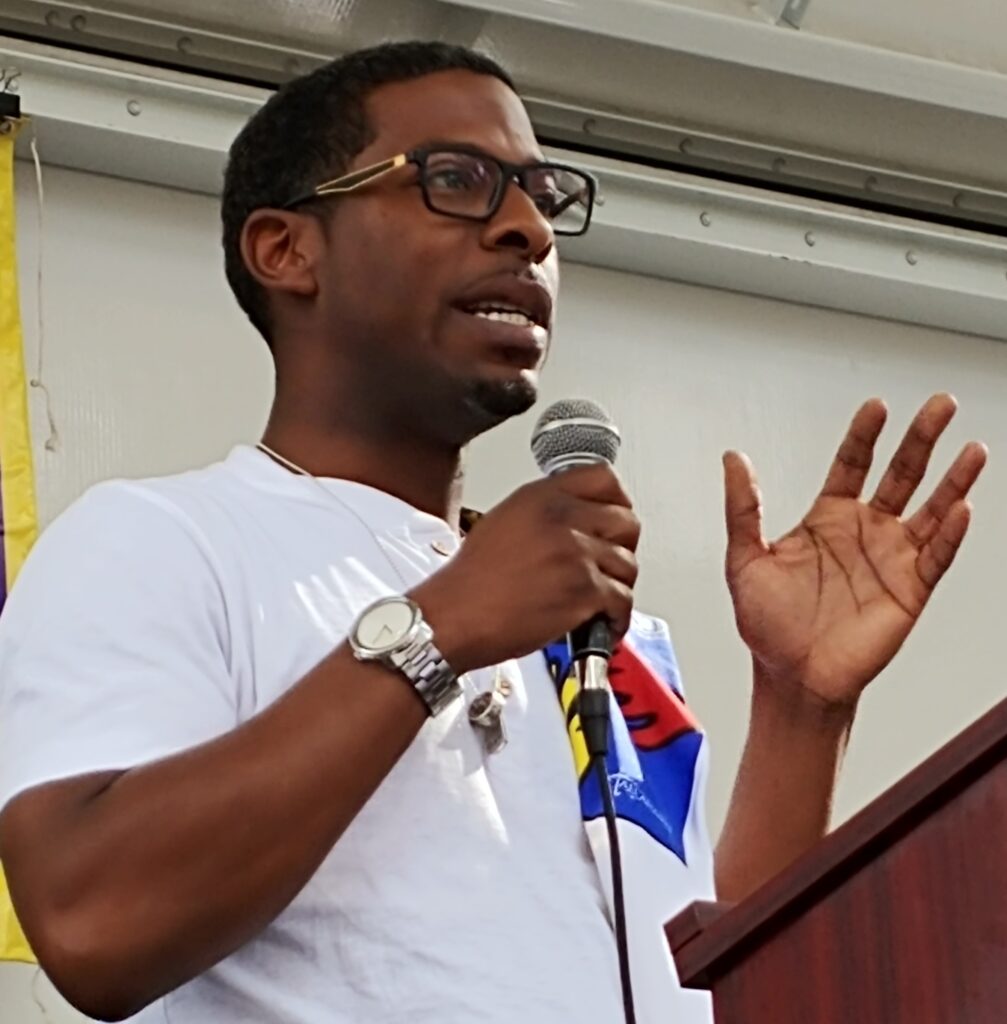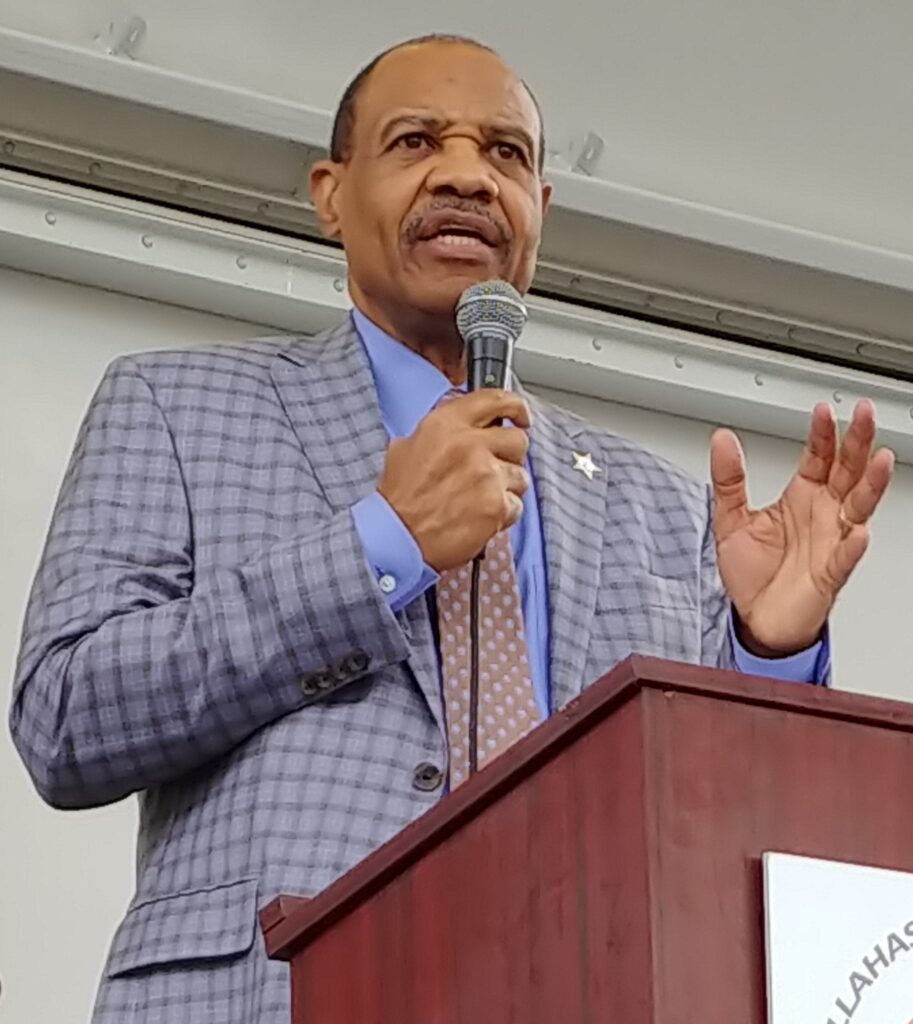
Leaders want less talk in fight against crime

Mutaqee Akbar, president of the NAACP, called for action in the fight against crime. 
Leon County Sheriff Walt McNeil delivered a very passionate speech on crime.
By St. Clair Murraine
Outlook Staff Writer
Speaking at a press conference that seemed more like a rally, government officials, community leaders and law enforcement officers appealed to the community to help deter teenagers from crime.
They called specifically for halting gun-related crimes that have been on the rise in recent months. Law enforcement statistics show that about 80 percent of gun-related and violent crimes in the area are committed by young people ages 15-21.
The conversation about guns and drugs in the city last Saturday on a stage set up at the intersection of Georgia and Macomb streets kicked off the Urban League’s Unity in the Community celebration. The event in Frenchtown returned after being postponed the previous two years because of the coronavirus.
Crime is especially being committed in communities with the 32304 zip code, which has the highest poverty rate in Florida.
Expressing frustration about the belief that arresting individuals who commit crime is the only solution, Leon County Sheriff Walt McNeil said it’s time to move beyond talking. Proof of what could work is in the results of a recent study by his agency titled “The Anatomy of a Homicide Project,” he said.
The report shows the correlation between youth and poverty in relation to crime. The report covers a five-year period, starting in 2015.
“We now have proof of what we already knew; that locking people up isn’t going to solve this problem,” McNeil said.
He said he planned to present the findings from the study to county commissioners at their meeting on Tuesday.
Each speaker emphasized that the time has come to move beyond talking, some making their points more passionate than others.
Community advocate and historian Delaitre Hollinger, responded to what he’d listened to for almost an hour, agreeing that stopping crime will take more than another round of conversations.
“It has to be something more than that,” he said. “Each person, not only the people that are here but the people within the community who call themselves community leaders are going to have to take it upon themselves to reach the young Black men.
“We have to go, whether by foot into the neighborhoods, door to door or into the school system; it’s up to us to do it. If we are sitting back waiting on someone else to do it it’s not going to happen.”
Concerning the demographic that tends to commit most crimes in Tallahassee, Deputy Tallahassee Police Department Chief Maurice Holmes said the 15-21 age group should be part of the conversation for solutions.
“We have to figure out a way to engage that age group so that they can release some of that anger,” Holmes said. “They are the ones that see this problem first-hand. They are the ones that know how it feels, they are the ones that’s losing their brothers and sisters, their classmates.”
Holmes wrapped up his speech by issuing a reminder for residents who carry a gun in their automobiles to lock them up. Studies have found that many gun-related crimes are committed with stolen weapons.
Several approaches were recommended by speakers for reducing crime, with almost everyone saying the effort has to go beyond meetings and more discussions.
County Commissioner Bill Proctor, who has held symposiums on poverty in recent years, was vehement about finding a solution.
“I’m frustrated as hell trying to talk about 32304 and lift this issue to a point of concern,” Proctor said. “It’s just time to look at where we are. I’m asking you to get serious about what responsibility we have in front of us.”
Proctor went on to call on Mayor John Dailey and other city and county commissioners to meet early next year to come up with solutions.
Dailey, who mentioned the case of a student taking a BB gun to one of his son’s school, said he supports Proctor’s idea.
“We wake up every day trying to make this city a better place,” Dailey said. “We wake up every day trying to keep our streets safe. This is a serious issue. It’s going to take everyone to get involved.”
Curtis Taylor, president/CEO of the local Urban League, disclosed that the organization’s national chapter has issued a comprehensive plan with recommendations for reducing crime. Taylor also told the audience that his grandchild was the victim of a shooting incident, which she survived.
He suggested that diversion programs that will keep young people off the streets with drugs and guns, could be a start to slowing down the recent rash of gun-related crimes.
Later on, Rudy Ferguson said that it was his involvement with the Urban League that helped to change his life. Ferguson, a candidate for an at-large seat on the County Commission, is pastor at New Birth Tabernacle of Praise.
He alluded to Urban League’s Operation BEATS program, which he was a part of in the 1980’s, as something that could be revived. He grew up in Griffin Heights, an area in the 32304 zip code where he still lives.
“I’ve lost a lot of friends from 1010 Basin Street, which was my stomping ground,” Ferguson said. “I’ve lost a lot of friends from Holton Street and Southside. I’ve lost a lot.”
Ironically, County Commissioner Nick Maddox, whose seat Ferguson is seeking, followed with a plea for adults to consider mentoring young people in their neighborhoods. It was mentoring that changed his life, Maddox said, pledging to be proactive.
“We are going to do all we can to try to create jobs and stop the violence and do everything we can to get guns off the streets,” Maddox said. “But we cannot do it by ourselves. We need every one of you to help us do that.”







